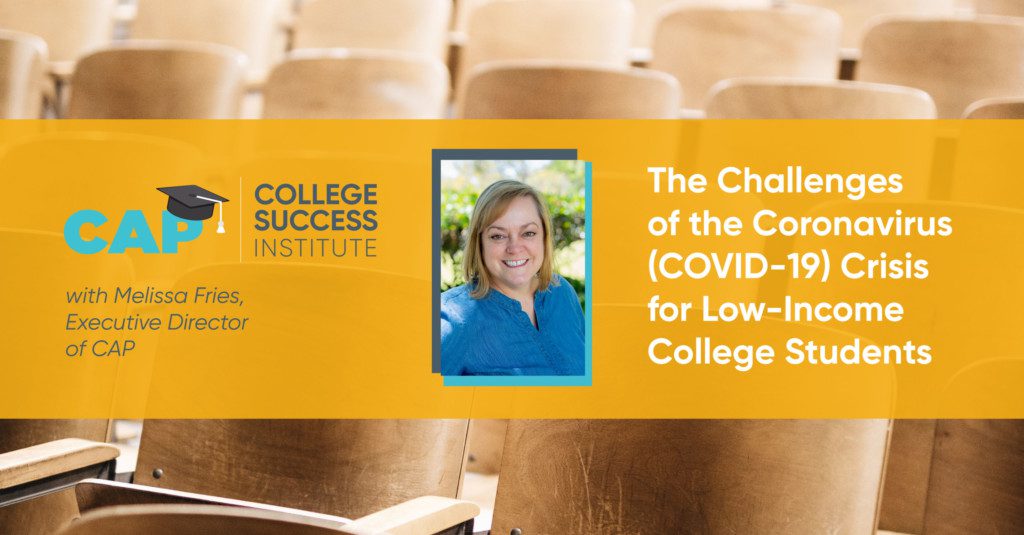
The Challenges of the Coronavirus (COVID-19) Crisis for Low-Income College Students
As the executive director of CAP, a college success program that helps low-income students navigate the challenges of college and get on a promising career path, my thoughts are naturally with our students in this uncertain time. With most college campuses closed indefinitely, the jolt experienced when everyone was trying to figure how to get back home with all their belongings hit low-income students hardest. At CAP, we’re working hard to reassure students that they aren’t alone, that we are all in this together, and that we will continue to be a resource in this uncertain time. We’re also focusing on helping seniors complete their programs so they can graduate on time and not delay advancing toward their desired careers.
This is the first installment in a new series we are publishing to explore proven ways we can help under-served students and their families overcome systemic barriers that run deeper than the impact of Coronavirus (COVID-19) and a possible recession.
Systemic challenges – financial, academic, and social-emotional
The systemic challenges to college completion and career advancement faced by low-income students—especially students of color from first-generation families—run the spectrum: financial, academic and social-emotional. Financial challenges, though, are perhaps the most pressing. Students from low-income families are mostly dependent on aid, scholarships and student loans, and daily living expenses are often difficult to manage. This can lead to food insecurity, with some students being forced to choose between buying textbooks and having enough to eat.
Financial challenges – access to fundamental resources
The Coronavirus (COVID-19) pandemic, which has resulted in nationwide campus closures, creates a whole new financial challenge; finding the resources to get home quickly with little time to plan. Most low-income families could not afford to send their children the money for a plane, train or bus ticket home. Furthermore, devoting all the money they could to getting home likely added to any existing food insecurity. Once home, students were thrust into unfamiliar remote learning environments in spaces that often are overcrowded or lack internet access. For students who lived on campus and were used to being part of their college communities, this has been a traumatic process.
Academic challenges – the shift to remote learning
Many students find themselves abruptly back at home, with access to campus academic and wellness resources limited. Transitioning to taking all classes online presents serious challenges. The closure of campuses has forced students to adjust overnight to remote learning in spaces that they didn’t originally plan to study in, such as a shared bedroom, the family kitchen, or other less than ideal places. In this new reality, students are, also, struggling to get instructional support they need to learn. Trying to negotiate these challenges in a household that may be grappling with significant challenges of its own can be overwhelming.
Social-emotional challenges – access to mental health services
Social and emotional issues are the hardest to quantify from an external perspective, but can be the most daunting. All students who had to quickly leave their campuses have encountered some degree of stress. That stress can be compounded when coupled with issues like childhood trauma, systemic racism and a lack of resources. These experiences make it harder for low-income students as they lose access to mental health resources they might have had on their campuses. The sudden closures separate students from roommates, friends, faculty and advisors who have been part of their support network. In some cases, returning home is not the most ideal environment for emotional support.
How we are supporting students
Grappling with all of these issues requires colleges and organizations who support college students to step up. CAP has been working with students to address their needs and look out for their well-being. First, we helped students make travel arrangements to get back home. Our financial services coordinators helped students secure transportation home, whether from abroad or across the country, providing funding when necessary. Simultaneously, our coaches have supported our students as they adjust to their new virtual college experiences, manage stress, and navigate unexpectedly moving back in with their families. The CAP team provides ongoing social and emotional support with a spirit of positivity and collaboration, reminding students that we are all going through this together, learning as we go. CAP is fortunate in that most of our work is done virtually, so we did not have much adjusting to do in terms of how we communicate with students. And, since we already provide scholarship funding, we know how to do that part of it.
At CAP, we are constantly seeking and then sharing resources with our students to assist with information on housing, financial aid, food security, career planning and so much more. Related to this new blog series, we will disseminate these shared resources so that college success practitioners can help further assist their students.
Unfortunately, most low-income college students don’t have access to the kind of help CAP and similar organizations are able to provide, leaving them bewildered and distraught at this sudden disruption to their lives and future plans. While these challenges are magnified by the Coronavirus (COVID-19), systemic barriers to college success will continue to exist once students are able to return to campus. Low-income students need support—financial, academic, social and emotional—and I’m honored to be part of an organization that is helping to show the way forward.
